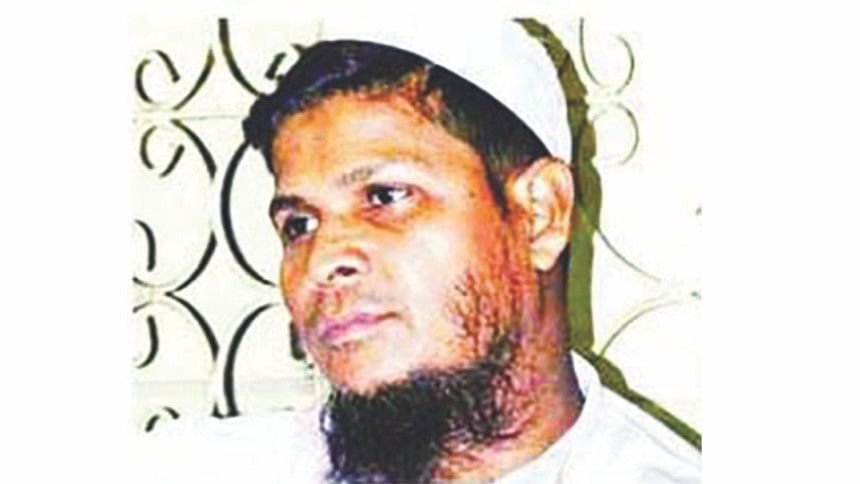1 gets death for killing Aminul

A Tangail court yesterday sentenced a man to death for the 2012 murder of labour rights leader Aminul Islam, an incident that had sparked protests and criticism at home and abroad.
Convict Mustafizur Rahman, himself a labour leader who allegedly became a source of an intelligence agency and industrial police, has been tried and sentenced in absentia. He went into hiding soon after the sensational murder.
Tangail Special Court Judge Waheduzzaman Shikder passed the order after hearing 25 witnesses and examining case documents, Tangail Special Public Prosecutor Multan Uddin told The Daily Star.
The victim's family and activists of Bangladesh Centre for Worker's Solidarity (BCWS) where Aminul worked rejected the verdict.
“The verdict only implicates the person who was used to abduct Aminul. The ones who plotted his murder have not yet been caught,” said Kalpana Akhter of the BCWS.
The BCWS and Aminul's family have long alleged that intelligence officials and Bangladesh Export Processing Zone Authority (BEPZA) were involved in the murder.
Aminul, 40, went missing on the evening of April 4, 2012. His body was found the next day at Ghatail in Tangail with torture marks.
The autopsy report said he was murdered.
The Criminal Investigation Department (CID) pressed charges against one accused, Mustafizur, in November 2013.
Aminul was an organiser of the BCWS for Savar-Ashulia area and also a leader of Bangladesh Garments and Industrial Workers' Federation (BGIWF).
During her Dhaka visit in May 2012, the then US secretary of state Hillary Clinton raised concerns about his murder.
"It would send the wrong signal to foreign investors and buyers if the murder of labor-rights activists like Aminul Islam are not properly investigated," The Wall Street Journal quoted Clinton as saying at the time.
Bangladeshi trade unions and industry associations, international business organisations, ambassadors of nine European countries, former US Ambassador Dan Mozena, US members of Congress, and international unions and non-governmental labour organisations also condemned the killing, according to a report by the International Labour Rights Forum (ILFR).
The US Congressional Bangladesh Caucus, led by Representative Crowley, urged Prime Minister Sheikh Hasina to ensure “no stone [is] left unturned in the search for justice,” the ILFR report added.
Talking to The Daily Star in April 2014, Aminul's family and colleagues claimed intelligence agencies had a hand in the murder.
They also claimed that the labour activist had earlier escaped from captivity after he was abducted by the National Security Intelligence (NSI) in 2010.
Hosne Ara Fahima, Aminul's wife, had said that intelligence agency personnel always kept her husband under surveillance.
Aminul had given the names of the abductors, who wanted him to stop labour organising activities at Ashulia and Savar and forced him to give statements saying that the BCWS was engaged in illegal and anti-state activities, said both Fahima and Kalpana Akter, executive director of the BCWS.
At the time, the BCWS sent a letter to the NSI seeking an explanation, but in a letter the intelligence agency denied torturing Aminul, Kalpana told The Daily Star in 2014.
Following the alleged abduction, the government cancelled the registration of the NGO. However, the registrations were reinstated later.
The Detective Branch (DB) of Police, which investigated the case initially, also found Mustafizur's link with intelligence agencies.
A DB source told The Daily Star at the time that scrutinising Mustafizur's phone call records, they found he had talked with at least two officials of the NSI and a security official of BEPZA on the day Aminul went missing and also a couple of days before and after that.
But the DB was not given the permission to take action against those officials, the source said.
Fazlul Kabir, assistant superintendent of police of the CID who pressed the charges, admitted to the The Daily Star that NSI officials indeed spoke with Mustafizur. “But they did so because he was their source. That does not mean they were involved."
The CID interrogated the intelligence officers in question but did not find anything that proved their involvement in the murder, he said.

 For all latest news, follow The Daily Star's Google News channel.
For all latest news, follow The Daily Star's Google News channel. 



Comments